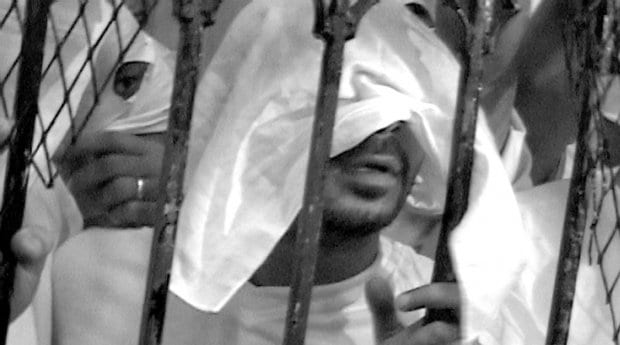Even in Egypt, it seems that old habits die hard. Egyptian authorities have returned to their old ways of drastically cracking down on gay and transsexual men, in a scene reminiscent of 2001’s Cairo 52 trials.
Earlier in September 2014, eight men stood trial in Cairo for appearing in a YouTube video showing two men exchanging wedding rings during what appears to be a men-only party on a boat in the Nile. One of the men who appeared in the video called in to a popular Egyptian TV show to say that the video was merely a joke, but political figures and local press continued to treat the video as evidence of a real same-sex wedding, causing a controversy in the mostly conservative Egyptian society. A verdict is expected in the trial on Nov 1.
More than a decade earlier, Cairo had woken up to news that 52 men had been arrested aboard a floating gay nightclub known as the Queen Boat, which was moored on the Nile in Cairo. “I was living in fear,” says Assem, one of the Cairo 52, in an interview with the International Business Times. Assem left Egypt for the United States after his release. “It was horrible. Thus I made the choice to leave about two months after the raid. It was the best thing I ever did.”
Back then, Elton John and Ian McKellen were among several prominent figures to protest the arrests and demand the immediate release of the men.
Those days are long gone, as arresting gay men in Egypt has become a mundane news story. Human rights activists report that more than 85 gay men were arrested this year alone in Cairo, accused of debauchery. Seventy of them remain locked up.
Gay men have served as an easy target for political leaders of Egypt over the years, before and after the Arab Spring. Visible and highly popularized arrests of gay men have often been used by the Egyptian regime to distract the general public. The Cairo 52 incident was used to distract citizens from then-president Hosni Mubarak’s decision to appoint his son as head of the ruling political party, establishing him as a future candidate for the presidency. The “New Boat” incident is seen by many as a way to inoculate President Abdul Fatah al-Sisi from the accusations of his opponents that he is too secular to govern the mostly Muslim Egypt.
“Egypt is witnessing a regression in the freedoms and rights that the January 25 Revolution called for,” says AA, a gay activist who lives in Cairo and asked to remain anonymous for security reasons.
“Gay and trans people never enjoyed state protection, but raids and arrests dramatically increased over the last year,” he tells Xtra via Facebook messenger. “This means the state is trying to appear socially and morally conservative to avoid accusations and comparisons to political Islamic groups’ conservative agendas.”
The Egyptian public prosecutor’s office said in a statement that the video was “humiliating, regrettable and would anger God” and concluded that the men in the video had committed a crime and would be treated as criminals.
“We live in a society that worships masculinity,” says Ayman (who asked that his real name not be used for fear of repercussions), a gay man who says he was attacked by two police officers.
“You have to follow the expectations of the society: you have to study, graduate, get married and have kids,” he tells Xtra by Skype. “If you break away from what the society sees in you, you’re doomed to be attacked.”
Ayman and his boyfriend rented a house together in Cairo months ago, but he says their landlady reported them to authorities because she suspected they were gay. “The police officers broke into our home without a warrant,” he alleges. “We were watching TV, and they just started to hit us while our landlady watched.”
Ayman and his boyfriend were kicked out of the house after they paid off the police officers as well as the landlady. “It was the only way to avoid a scandal,” he says.
These latest raids came as no surprise to the gay community in Cairo, says Ahmad, an Egyptian man who escaped Egypt to Europe in 2013 after receiving serious threats on his life, as well as the life of his supportive sister.
“A prophecy has been going through the gay community that a second Queen Boat mass-arrest will happen,” he explains, adding that he doesn’t blame Egyptian gay men for their fears.
“I am not even sure why the state would do something like that. No explanation but a bunch of men trying to sustain some illusion of public morality,” he tells Xtra by email.
This constant fear for one’s life has devastating results: many Egyptian gay men would rather escape their country than swim in the sea of rumours and threats they face on a daily basis. Ahmad, for example, tried to ignore the threats but eventually gave in under the pressure. “I thought I could be easily portrayed as a gay atheist spy or something ridiculous like that, which would be so appealing to many tabloids in Egypt,” he says, “and I was not ready to go down, not yet, and not for nothing.”
AA shares the same sentiments. “I need to take a break from the sense of fear I go through daily,” he says. He believes that his country is going through political and social changes that he needs to witness and influence but says he’s also hoping “to avoid possible arrest.”
The gay hookup app Grindr pops up a notification when used in Egypt, warning users about possible arrests in the country. “My message to users in Egypt has been to be as discreet as you can, as savvy as you can and to be very careful,” Grindr founder Joel Simkhai says in an interview with The New York Times. “As I say the word discreet, it hurts me. I am a proud gay man. But we’re at a point in some countries where this is a life-and-death issue; it can mean imprisonment.”
Ahmad encourages others to follow his footsteps and escape Egypt for a better life in countries where gay rights are recognized. “Of course, if you see yourself a fighter for freedom, then stay and fight. God bless you,” he says with an implied smirk, “but I know gay rights won’t happen in Egypt in my lifetime. I won’t even witness a pinch of it.”


 Why you can trust Xtra
Why you can trust Xtra


